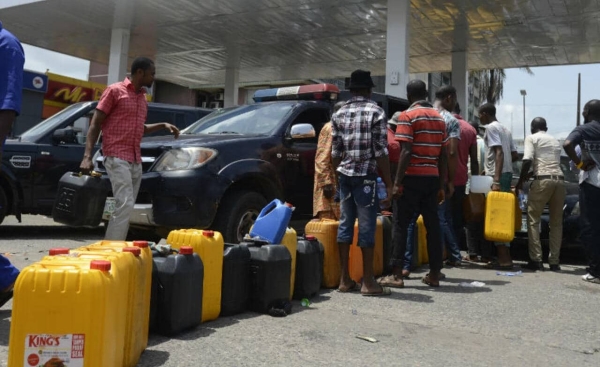he ongoing petrol scarcity in Nigeria shows no signs of abating, with a $6 billion debt to fuel suppliers, liquidity challenges, and other factors severely hindering the Federal Government’s ability to maintain product importation.
Oil marketers have reported that the current exchange rate of $1,500 per dollar has driven the landing cost of petrol to over ₦1,100 per liter, making it nearly impossible for them to import the product.
As a result, the shortage continues to affect businesses and the broader economy.
The Nigeria Employers Consultative Association (NECA) highlighted yesterday that the country’s economy remains under significant pressure due to fluctuations in the foreign exchange market, ongoing low crude oil production, and high monetary policy rates, all of which are constraining business activities.
Investigations by Vanguard revealed that stakeholders in the fuel supply chain have adopted strategies to maximize the distribution of the limited available supply.
Major marketers and depot owners reportedly obtain the product at around ₦560 per liter, selling it to independent marketers for between ₦670 and ₦680 per liter.
These independent marketers, who bear the cost of transportation to various parts of the country, sell petrol to consumers at prices ranging from ₦700 to ₦900 per liter, depending on the location.
Long queues were observed at the few filling stations that were operational yesterday, while many others remained closed due to a lack of product.
NNPC Admits Debt to Petrol Suppliers
In response to the worsening situation, the Nigerian National Petroleum Company Limited (NNPCL) acknowledged its significant debt to petrol suppliers, which it says is threatening the sustainability of fuel supply in the country.
According to NNPC’s Chief Corporate Communications Officer, Olufemi Soneye, the company is actively working with government agencies and stakeholders to maintain a consistent supply of petroleum products nationwide.
Soneye, stated: “NNPC Ltd has acknowledged recent reports in national newspapers regarding the company’s significant debt to petrol suppliers.
‘’This financial strain has placed considerable pressure on the company and poses a threat to the sustainability of fuel supply.
‘’We are actively collaborating with relevant government agencies and other stakeholders to maintain a consistent supply of petroleum products nationwide.”
NNPC also disclosed that the total subsidy on petrol from August 2023 to December 2024 is projected to reach ₦5.4 trillion.
Despite the removal of the petrol subsidy in June 2023, which initially saved the federation ₦400 billion monthly, the company’s importation costs turned negative in August 2023, largely due to the devaluation of the naira.
Independent Marketers Struggle with Supply Access
The Independent Petroleum Marketers Association of Nigeria (IPMAN) expressed frustration over its members’ exclusion from direct bulk supply of petrol from NNPCL.
IPMAN’s Public Relations Officer, Chief Chinedu Ukadike, emphasized that without access to direct supply, the lingering fuel queues will persist.
Although petrol has started arriving at ports in Warri, Port Harcourt, and Lagos, IPMAN members have faced difficulties in accessing the product.
Ukadike explained that independent marketers have had to source petrol from private depot owners at high rates, further driving up the cost to consumers.
He also highlighted the increased cost of transporting petrol from coastal depots to inland locations like Abuja, which has risen from ₦500,000 to ₦3.5 million due to high diesel prices, truck maintenance, and poor road conditions.
Calls for Competitive Downstream Sector
Oil marketers have called for a reduction in the pump price of diesel to around ₦700 per liter to improve the distribution of petrol across the country.
President of the Natural Oil and Gas Suppliers Association of Nigeria (NOGASA), Benneth Korie Doi, suggested that NNPC leverage its stake in Dangote’s refinery to lower costs and create a more competitive downstream sector.
He argued that monopolies in the industry are detrimental and that a competitive environment is necessary for the healthy circulation of petroleum products.
Doi also praised Aliko Dangote’s contribution to the industry with the establishment of Nigeria’s largest refinery, which has a capacity of 650,000 barrels per day. He urged that Dangote’s refined products be distributed widely to ensure sustainable supply across the country.
Dangote Refinery Seen as Potential Solution
Chairman of the Lagos chapter of the Petroleum Products Retail Outlets Owners Association of Nigeria (PETROAN), Joseph Ehimen, expressed hope that the Dangote Refinery could play a crucial role in ending the fuel shortage once it becomes fully operational.
He acknowledged the efforts by NNPCL to maintain refineries but stressed the need for expedited action to bring them online and alleviate the suffering caused by the limited supply of petrol.
Joseph Ehimen, said: “The sector was deregulated to bring about positive changes. But the changes have been wiped out because of this fuel shortage.
‘’Nigerians are suffering because of limited supply. As operators, we are also facing many problems, including the high cost of moving the product from the depots to the filling stations, maintenance cost and dues.
“We are aware of efforts by NNPC Ltd to maintain the refineries. We need to get them to work as quickly as possible. If all required arrangements are made, Dangote Refinery should be able to assist in ending the fuel shortage because of its huge 650,000 barrels per day capacity.”


